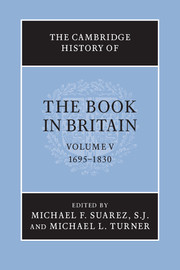Book contents
- Frontmatter
- Introduction
- PART I THE QUANTITY AND NATURE OF PRINTED MATTER
- PART II ECONOMIC, LEGAL AND CULTURAL CONTEXTS
- PART III THE TECHNOLOGIES AND AESTHETICS OF BOOK PRODUCTION
- PART IV THE BOOK TRADE AND ITS MARKETS
- I LONDON AND THE ‘COUNTRY’
- II TWO CASE STUDIES
- 18 Richard Francklin: a controversial publisher, bookseller and printer, 1718–1765
- 19 The Longmans and the book trade, c.1730–1830
- III SERIAL PUBLICATION AND THE TRADE
- IV THE INTERNATIONAL MARKET
- V BOOKS AND THEIR READERS
- Abbreviations used in bibliography
- Bibliography
- Index
- Frontispiece
- Plate section
18 - Richard Francklin: a controversial publisher, bookseller and printer, 1718–1765
from II - TWO CASE STUDIES
Published online by Cambridge University Press: 28 September 2010
- Frontmatter
- Introduction
- PART I THE QUANTITY AND NATURE OF PRINTED MATTER
- PART II ECONOMIC, LEGAL AND CULTURAL CONTEXTS
- PART III THE TECHNOLOGIES AND AESTHETICS OF BOOK PRODUCTION
- PART IV THE BOOK TRADE AND ITS MARKETS
- I LONDON AND THE ‘COUNTRY’
- II TWO CASE STUDIES
- 18 Richard Francklin: a controversial publisher, bookseller and printer, 1718–1765
- 19 The Longmans and the book trade, c.1730–1830
- III SERIAL PUBLICATION AND THE TRADE
- IV THE INTERNATIONAL MARKET
- V BOOKS AND THEIR READERS
- Abbreviations used in bibliography
- Bibliography
- Index
- Frontispiece
- Plate section
Summary
The career of Richard Francklin (c.1696–1765) – bookseller, publisher and printer – spanned a crucial period in the history of the eighteenth-century book. Born soon after the lapse of the Licensing Act (1695), he died soon after the furore over the North Briton (1764). Examining Francklin’s mix of business activities, this study considers Francklin’s career as a representative example of early to mid-Georgian stationers.
The shop
The Stationers’ Company Registers do not show Francklin’s name among the listed apprentices and, indeed, only record one apprentice of Curl’s, a ‘Thomas Dyer’ or ‘Dryer’ turned over to Curll in 1711 and freed in 1713; nonetheless Ralph Straus claimed Francklin was Edmund Curll’s ‘own apprentice’. From 1750, Francklin was a London ‘Citizen and Cordwainer’, freed of that company. Certainly he was working for Curll by September 1717, when he produced a ‘true Copy’ for Curll and authenticated it with the words, ‘Witness my Hand’. His name first appeared on a title page in 1718. Francklin’s original shop in 1718 was ‘at the Sun against St Dunstan’s Church in Fleetstreet’, near Curll’s shop at the Dial and Bible; the title page of The art of beauty (1719 [1718]) claimed he was also at the ‘Court of requests’. From about 1726 to 1758, he was located ‘under Tom’s Coffee-house in Covent Garden’, later no. 17 Russell Street. His move was paradigmatic of the book-trading world’s shift from the traditional St Paul’s and City environs into the newly emergent West End, and the continuing influence of coffee houses as centres for political and cultural discussion.
- Type
- Chapter
- Information
- The Cambridge History of the Book in Britain , pp. 383 - 396Publisher: Cambridge University PressPrint publication year: 2009



